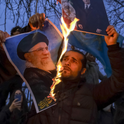“This is the war to end wars,” intoned the Israeli ambassador to Washington on day five of Israel’s assault on Iran. They said that of the first and second world wars, and it is even more obvious nonsense in respect of today’s explosive Middle East. The harder prediction is how even this second Israeli war ends, in the context of its still unresolved first war in Gaza.
It doesn’t look as if the Islamic regime in Tehran is on the brink of collapse. There is currently no election crisis, internal power struggle or imminent ground invasion by a neighbour of the kind that has periodically rocked the regime since the 1979 Islamic revolution. Nor does it look as if Donald Trump, for all the imperial grandstanding of his second term, truly wants to involve the US in a war to bring about regime change. Memories of the Iraq invasion are still too raw and recent, quite apart from Trump’s mantra that he doesn’t do foreign wars like his predecessors.
So the immediate issue is whether Trump has given Benjamin Netanyahu carte blanche not only to take over Gaza but also to maintain a military crisis short of all-out war in respect of the weakened Islamic regime in Tehran. The two are clearly linked, in that Netanyahu’s intent to take over Gaza is far easier to accomplish if all eyes are on Tehran.
The obvious step would be for Ayatollah Khamenei and his surviving henchmen in Tehran to agree immediately to whatever Trump demands in respect of their capacity to develop nuclear weapons. But this would starkly exhibit the weakness of the Islamic regime internally, so a stand-off—with periodic drone attacks and other military skirmishes—could continue for some time.
This probably suits Netanyahu too. It maintains the “existential” threat to Israel while he further colonises the West Bank and seeks to take over Gaza entirely. All of which also makes it harder for him to be dislodged within Israel itself, by maintaining the country on a semi-permanent war footing and state of siege.
Whether or not Israel continues in this semi-hot war with Iran, an iron triangle appears to have formed between by the three strongmen currently determining the fate of the Middle East: Trump, Netanyahu and Saudi Arabia’s Mohammed bin Salman. Netanyahu is clearly banking on this power axis not only weakening Iran but also preventing any strong Arab front forming against him or giving meaningful support to Lebanese or Palestinian militant groups in the short term. This is crucial to enabling him to get his way in Gaza and the West Bank, including an agreement on the fate of the displaced residents of Gaza.
But none of this conjures up an actual plan to provide homes and a future to some two million Palestinians in Gaza. So this new war with Iran, which Netanyahu hopes will enable him to better manage his other war in Gaza, could simply leave Israel with two ongoing conflagrations that even Trump can’t turn into triumphs—let alone wars to end further wars.
Even Trump can’t end Israel’s wars
Netanyahu believes Gaza will be easier to take over with all eyes on Tehran. It won’t be so simple
June 18, 2025

Donald Trump left the G7 early as the Israel-Iran conflict intensified. Image: Associated Press / Alamy Stock Photo












